Israel Blames Iran For Attack On Oil Tanker
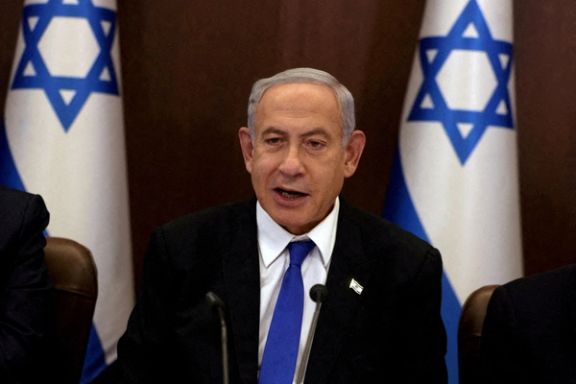
Israeli Prime Minister Benjamin Netanyahu on Sunday said that Iran was responsible for a reported attack on an oil tanker last week.

Israeli Prime Minister Benjamin Netanyahu on Sunday said that Iran was responsible for a reported attack on an oil tanker last week.
An attack on the Liberian-flagged Campo Square was confirmed on Saturday by the ship's captain, who said it was lightly damaged by an airborne object on February 10 while sailing through the Arabian Sea.
Shipping databases linked the tanker to Zodiac Maritime, which is controlled by Israeli shipping magnate Eyal Ofer.
"Last week Iran again attacked an oil tanker in the Persian Gulf and harmed the international freedom of navigation," Netanyahu said at a weekly cabinet meeting.
Regional defense and security sources have said they suspected the assault was carried out by Iran, which did not comment on the incident.
Tehran has rejected accusations it was behind similar attacks in the past few years.
British maritime security company Ambrey Intelligence said unmanned aerial systems had attacked two tankers and one bulk carrier in the Arabian Sea and assessed that Tehran had mounted the attack. Two of the merchant vessels were Israeli-owned and one was Emirati, it said.
The attack came during antagonism between Iran and the West over Tehran's nuclear activity and its supply of arms - including long-range "suicide drones" - for Russia's war in Ukraine, as well as months of anti-government demonstrations at home.
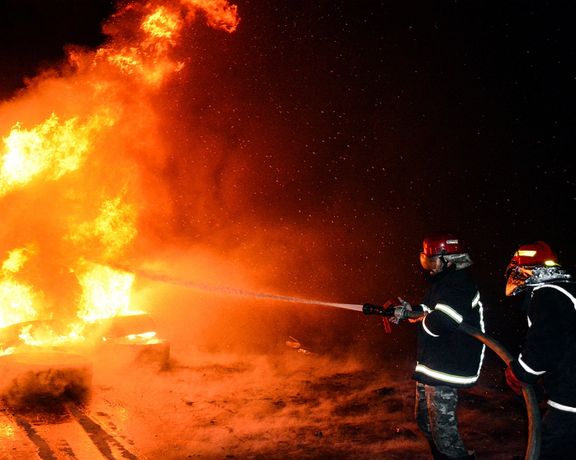
Iran’s foreign ministry condemned an Israeli rocket strike Sunday on “a residential area” in central Damascus, and the “martyrdom of several civilians.”
An Israeli rocket strike early on Sunday hit a building in central Damascus's Kafr Sousa neighborhood near a large, heavily guarded security complex close to Iranian installations, killing five people, witnesses and officials said.
Iran's foreign ministry spokesman Nasser Kanaani condemned the attack, which he likened to recent attacks by ISIS in Syria.
The rare, targeted strike damaged several buildings in the densely populated district close to Omayyad square in the heart of the capital, where multi-story security buildings are located within residential areas.
Iranian media reported 5 people killed and 15 injured, according to an early count. The Syrian Observatory for Human Rights reported that 15 people were killed in the attack.
An Israeli military spokesperson declined to comment.
Citing a military source, state media said Israel had carried out air strikes targeting several areas in the capital shortly after midnight, causing five deaths and 15 injuries among civilians, and damage to several residential buildings.
"It caused damage to several civilian homes and material damage to a number of neighborhoods in Damascus and its vicinity," the army said in a statement.
It was not immediately clear whether the strike was aimed at a specific individual.
Pro-Iran Hezbollah's top commander Imad Moughniyeh was killed in 2008 in a bombing in Kafr Sousa, a heavily policed area where residents say several Iranian security agencies are located, including a major cultural center.
Israel has been carrying out air strikes against suspected Iranian-sponsored weapons transfers and personnel deployments in next-door Syria since 2017. Iran has expanded its military presence in Syria in recent years and has a foothold in most state-controlled areas, with thousands of members of militias and local paramilitary groups under its command, Western intelligence sources say.
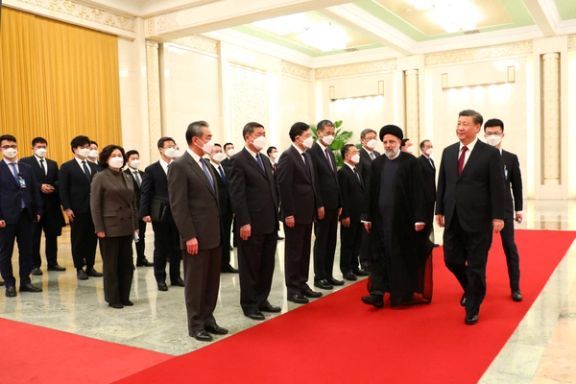
Islamic Republic's hardliner officials and media say President Ebrahim Raisi’s state visit this week to China “defeated the project to isolate Iran”.
“The Iranian president’s visit to Beijing was made at a time when western powers, with the help of some misled elements, were trying to isolate Iran in the international community. This visit ruined the enemies’ plans and defeated the project of isolating Iran,” Moslem Salehi, a member of the parliament’s economic committee told the official news agency (IRNA) Saturday.
Moslemi also said Iran can “challenge the unilateralism of the United States” as an influential country alongside Russia and China and argued that Beijing’s cooperation with Tehran at this juncture is proof of Iran's “political stability”.
As Iran's protest movement enters its sixth month, European powers are increasingly sending strong signals that they no longer consider diplomacy a viable route in their dealings with the Islamic Republic, without fundamental changes in Tehran’s policies.
In the latest development, the Islamic Republic not only lost an invitation to the Munich Security Conference, but also had to witness the presence of the Iranian opposition figures, most notably the exiled crown prince, Reza Pahlavi, who was a speaker at the conference. In an unattributed commentary Saturday, the official news agency (IRNA) slammed the exclusion of Iran, and its strategic ally Russia, from the conference.
Pro-government officials claim that tighter relations with China and Russia will balance out the pressure from the US and European powers. “To counter these pressures we need breathing space to be able to manage the country’s affairs,” conservative former lawmaker Seyed Reza Akrami told Khabar Online.
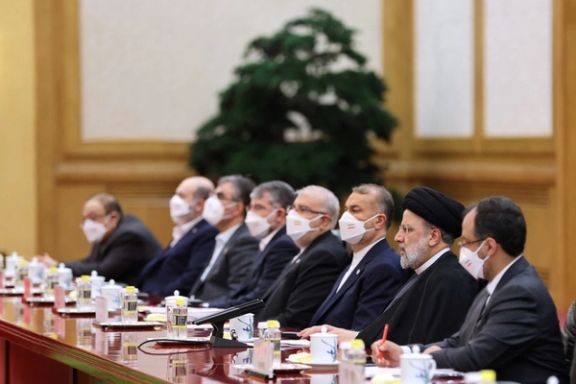
He argued that China’s invitation to the Iranian president was “extremely important” given that Iran has not agreed to the restoration of the 2015 nuclear deal, Joint Comprehensive Plan of Action (JCPOA) or acceded to the conventions of the Financial Action Task Force (FATF) which Raisi and other hardliners have strongly opposed.
Iran has been on the FATF blacklist, along with North Korea, since February 2018 for failing to pass legislation introducing transparency measures designed to combat money-laundering, corruption, and financing of ‘terrorism.’
Many analysts, politicians and former government officials in Iran say that failure to join the FATF is detrimental to economic relations with the world, including Russia and China, as foreign banks would still be wary over transactions with Iran.
According to the head of Iran’s Trade Promotion Organization (TPO) Alireza Peyman-Pak, during Raisi’s China visit the two countries signed “19 documents, contracts, and agreements in the fields of industry, mining, and trade, apart from another 20 major documents” to the tune of 3.5 billion dollars.
However, in a series of tweets on Friday, Hamid Aboutalebi, the political deputy of former President Hassan Rouhani’s office argued that Raisi’s] visit to Beijing would not result in a such a ‘strategic balance’.
In the joint statement of the two presidents, Aboutalebi pointed out, there is no mention of the 25-year Comprehensive Cooperation Agreement signed in 2021. There is also no word about Chinese nuclear cooperation with Iran, the modernization of the Arak heavy water reactor which in 2016 during Jinping’s visit to Tehran, they agreed to advance. Banking and financial cooperation was also not mentioned.
Aboutalebi claimed that China has only agreed to mention the lifting of US sanctions in the joint statement only within the context of reviving the 2015 nuclear deal.
Warning not to pin too much hope on China, he wrote, “So, let’s be aware that [Raisi’s] visit to Beijing will not result in a ‘strategic balance in Iran's foreign relation’.”
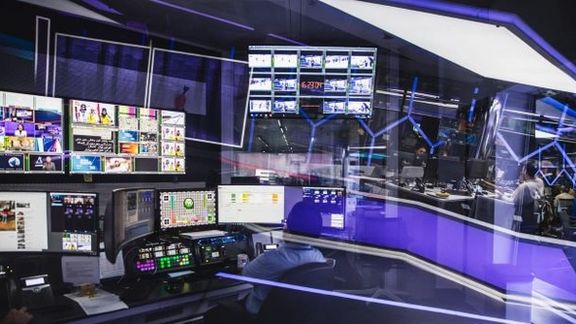
After a significant escalation in state-backed threats from Iran and advice from the Metropolitan Police, Iran International TV says it has reluctantly closed its London studios and moved broadcasting to Washington DC.
The station will continue to operate from its offices in Washington DC uninterrupted.
Threats had grown to the point that it was felt it was no longer possible to protect the channel’s staff, other employees at Chiswick Business Park and the general public.
Iran International was warned by authorities in November that its journalists were under threat from Iranian agents and the Metropolitan Police took measures to strengthen security around the network’s office in the area.
The channel's broadcasts have gained special significance since popular anti-regime protests broke out in Iran last September. Iranian officials have repeatedly threatened Iran International and other Persian broadcasters based abroad since the start of protests when the government blocked the Internet to deny the population news and information.
Amid repeated threats by the Islamic Republic against Iran International’s reporters, the UK government vowed in December to step up protection of London-based Iranian journalists.
British Foreign Minister James Cleverly said during a session in Parliament on December 13 that the Foreign and Commonwealth Development Office (FCDO), in partnership with the Home Office, had ensured that the Iranian journalists were protected by the British police.
“The UK remains absolutely determined to ensure that Iran does not intimidate people within this country. We will always stand up to the aggression from foreign nations,” he noted, adding, “We will absolutely not tolerate threats, particularly towards journalists who are highlighting what is going on in Iran, or indeed any other individual living in the UK.”
A man was arrested in the vicinity of Iran International’s headquarters last Saturday and charged with a terrorism offence. He pleaded not guilty in a court session on Tuesday.
Mahmood Enayat, General Manager of Iran International TV, said after the decision to move broadcasting to Washington:
“I cannot believe it has come to this. A foreign state has caused such a significant threat to the British public on British soil that we have to move. Let’s be clear this is not just a threat to our TV station but the British Public at large. Even more this is an assault on the values of sovereignty, security and free speech that the UK has always held dear.
Day and night our journalists strive to deliver the 85mn people of Iran and its diaspora the independent, uncensored news they deserve.
We refuse to be silenced by these cowardly threats. We will continue to broadcast.
We are undeterred.”
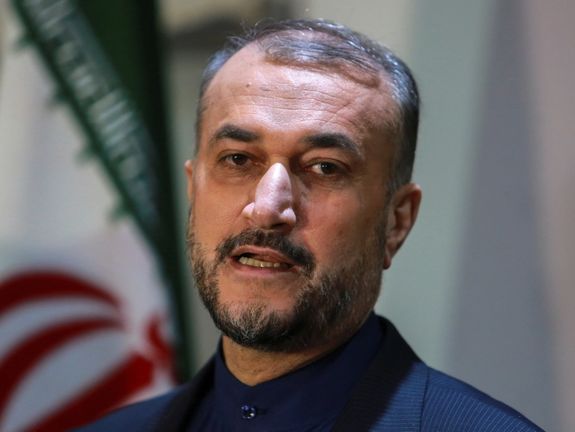
Indian media reported that Iran’s foreign minister has canceled a trip to New Delhi for a conference because a promotional video shows Iranian women cutting their hair.
The Indian Express wrote on Friday that Hossein Amir-Abdollahian refused to attend the meeting after India ignored Tehran's request to remove two seconds from the video.
The governments of New Delhi and Tehran have yet to react to this report.
In a situation that Tehran has become more isolated by Western countries, this could be a sign that the Iranian regime is also being further sidelined in its relationship with countries that usually it had friendly ties with.
According to Indian Express, the Raisina Dialogue conference will be held in New Delhi in two weeks with the participation of the ministry of foreign affairs of India and the "Observer Research Foundation" thinktank for two days.
The short teaser of the conference includes images of the most important events of 2022.
In the first months of the "Woman, Life, Freedom" protests, many women and girls in Iran cut their hair in the streets, classrooms and on the graves of their dead loved ones in a move to show anger at the clerical ruler’s brutality. Women in other countries also cut their hair in public as a sign of solidarity with Iranian protesters.
Iranian regime has killed over 500 protesters following the death of Mahsa Amini in police custody in September.

A Bloomberg report says Israel has taken the initiative to advance US-sponsored talks with Saudi Arabia and strengthen the "military and intelligence" cooperation between the two countries with the aim of countering "threats" by Iran.
Citing several informed sources, Bloomberg reported Friday that before the recent meeting of the joint working group of the United States and the Gulf Cooperation Council in Riyadh, Saudi and Israeli officials met to assess the areas of cooperation between the two countries.
“Further engagement is expected to take place in Prague to coincide with the Munich Security Conference this weekend,” the sources told Bloomberg.
In recent years, drone attacks on oil tankers in the Persian Gulf, as well as Saudi oil facilities, which have been attributed to Iran and militias supported by the Iranian regime, have fueled concerns about threats from the Islamic Republic.
“We think that other regions integrating and beginning to sit at the same table with Israel is in the interest of stability and security in the region,” US Deputy Assistant Secretary of Defense for the Middle East, Dana Stroul, said in Riyadh on Monday.
The US government and six Persian Gulf Arab states on Thursday jointly called Tehran a growing threat to regional security.
Saudi Arabia cut ties with Iran in 2016 when mobs attacked its embassy in Tehran after Riyadh executed 47 dissidents including the leading Shiite cleric Sheikh Nimr al-Nimr.